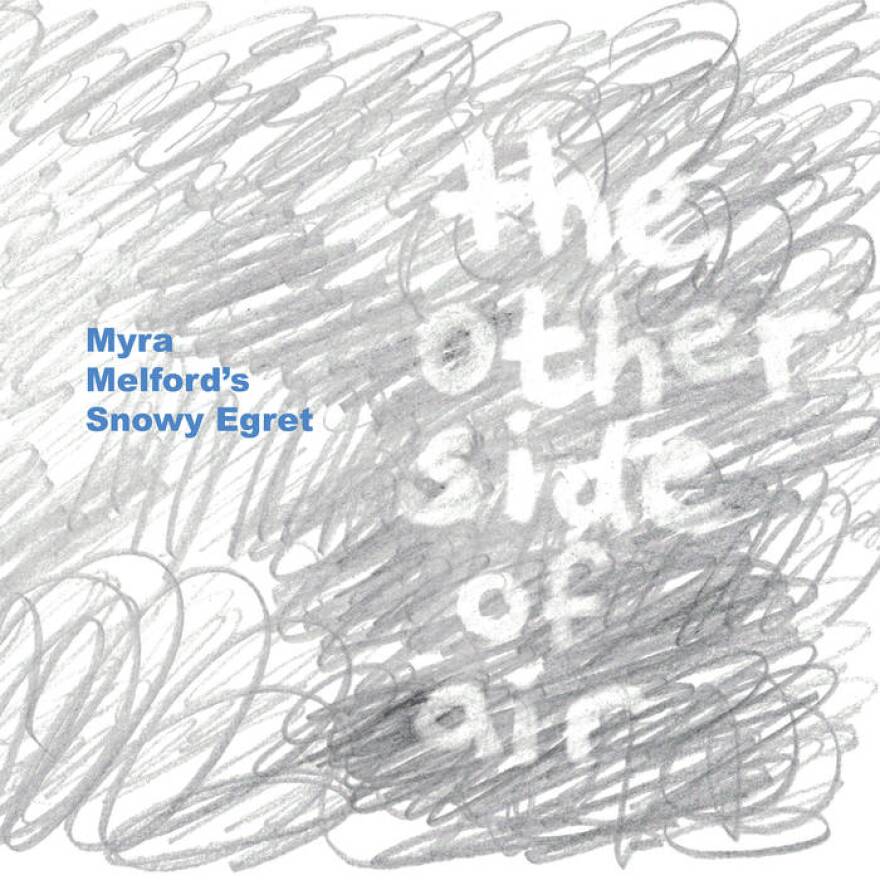Myra Melford’s Snowy Egret, “Motion Stop Frame”
Pianist and composer Myra Melford has long been a study in motion, creating and collaborating across a range of sonic expression. Her majestic new album, The Other Side of Air, just out on Firehouse 12 Records, is a dispatch from her ensemble Snowy Egret: cornetist Ron Miles, guitarist Liberty Ellman, bass guitarist Stomu Takeishi and drummer Tyshawn Sorey.
These are improvisers with an exquisite command of color, texture and pulse — qualities that Melford marshals freely throughout her compositions. The album includes passages of springy funk and squalling free improvisation, but at every turn there’s a clear unity of purpose, a spirit of soulful cohesion. The interplay is both imposingly advanced and approachable, provided you come clean, with no agenda of your own.

“Motion Stop Frame,” which opens the album, derives its title and some of its motivation from South African artist William Kentridge, who creates animated films based on epic charcoal drawings. That sense of layered meaning and manipulated time are implicit in Melford’s organization of the multi-part theme — and in an open-form section that begins just before the three-minute mark, leading to a furious gyre of a piano solo before returning to form.
Snowy Egret appears Wednesday and Thursday at Dizzy’s Club Coca-Cola.
Marquis Hill, “Kiss & Tell”
The convergence of modern jazz and hip-hop suggests more than a trend line for Marquis Hill, a trumpeter originally from Chicago. Modern Flows Vol. 2, an album releasing this Friday on Black Unlimited Music Group, is his latest argument for eliding the divisions between these musical languages.
Hill is well positioned to make that case, in ways that feel natural and personal. And he has the right crew for the task: alto saxophonist Josh Johnson, vibraphonist Joel Ross, bassist Junius Paul and drummer Jonathan Pinson. The album also includes several guest vocalists — including, on the slow-simmering “Kiss & Tell,” Rachel Robinson and Braxton Cook. Their cool exchange of intimiacies on the track enacts a millennial update to a classic tag team like Marvin Gaye and Tammi Terrell.
In Common, “Unsung”
Joel Ross, the quicksilver vibraphonist playfully known in musician circles as “Young Genius,” is also a member of the collective In Common, whose self-titled debut is due out this Friday on Whirlwind Recordings. The others in the mix suggest a modern all-star team: tenor saxophonist Walter Smith III, guitarist Matt Stevens, bassist Harish Raghavan and drummer Marcus Gilmore.

“Unsung” is a Stevens composition drawn in a coolly streamlined style, swinging in an unhurried clip. Gilmore strikes a classic balance of chop and glide, beneath several crisp solos in turn: guitar, then tenor, then vibes. The hyperfluency among these players is never exploited for flash, or mistaken for the main point. It’s simply a means to more lyrical ends, and folded into a model of interplay that suits the name of the band.
Rudy Royston, “Flatbed Buggy”
The deep, elastic groove in Rudy Royston’s drumming has become a prominent feature on the our jazz landscape, powering bands led by guitarist Bill Frisell, trumpeter Dave Douglas and myriad others. Royston has also shown poise as a bandleader and composer — most recently with Flatbed Buggy, his third album on Greenleaf Music. Along with a root-level hookup of Royston and bassist Joe Martin, it features a whimsically unconventional array of timbres: John Ellis (mainly) on bass clarinet, Gary Versace on accordion and Hank Roberts on cello.
There’s a folk character to this instrumentation, and Royston amplifies that feeling on the album’s brightly loping title track. The hint of New Orleans second-line bounce in the tune provides a nice cushion for Versace’s accordion solo, and for a smartly blustery statement by Ellis.
Ben Sidran, “Piano Players”
Listen closely and you’ll get a lot of mileage out of Ben There, Done That: Ben Sidran Live Around the World (1975-2015), a limited-edition three-disc set releasing this Friday on Sunset Blvd Records. As the title implies, it’s a travelogue spanning 40 years of music-making, in locales as far-flung as London, Osaka and Sidran’s hometown of Madison, Wis. Coproduced by Sidran and Zev Feldman, this collection features 27 tracks, an interview conducted by Mark Ruffin, and insightful liner notes by Becca Pulliam, who worked alongside Sidran on NPR’s Jazz Alive!

Sidran’s wry, garrulous style as a singer-songwriter dovetails with his Horace Silver-inspired presence at the piano — a balancing act that acquires special resonance on “Piano Players,” a tune captured here in a 2000 performance in Paris. A classic “list song,” it fondly name-checks dozens of jazz pianists, often with a healthy dose of wordplay. Along with his son, Leo Sidran, on drums, Ben is heard here with bassist Billy Peterson and the Italian saxophonist Alphonso Deidda. You could also say he’s heard here with the ghosts of his precursors — especially in the final moments, when he sings: “Taking a page from Mose / We gotta close.”





